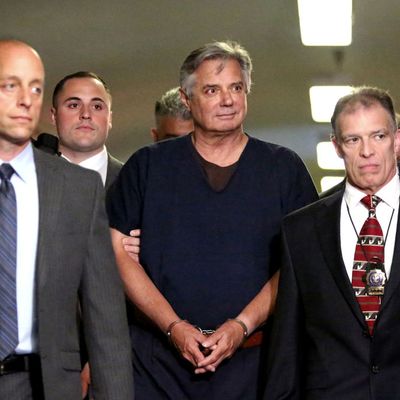
If one wants to dabble in some extra-judicial behavior in Ukraine, it would make sense to contact former Trump campaign chairman and current FCI Loretto inmate Paul Manafort. One of Manafort’s deputies, Rick Gates, once told a group of lobbyists that in Kiev, “Paul has a whole separate shadow government structure … In every ministry, he has a guy.” During his years as a lobbyist in the country, Manafort was so successful at navigating its political inner-workings that prosecutors claim he made over $60 million.
According to a report from the Washington Post, Rudy Giuliani did contact Manafort, while unsuccessfully pursuing evidence that would prove the real interference in the 2016 election was not of Trump-Russia, but Clinton-Ukraine. Giuliani claims that he has not spoken directly to Manafort in over two years, but admitted in an interview with the Post that, several times in recent months, he did consult him via lawyer in an attempt to find a dossier that he believed could cast doubt onto the Russia investigation:
Giuliani said his consultation with Manafort centered on trying to ascertain the veracity of a secret black ledger obtained by Ukraine’s National Anti-Corruption Bureau, which the New York Times revealed in an August 2016 story. The Times said the ledger recorded $12.7 million in cash payments from Yanukovych’s political party to Manafort. The revelation led Manafort to resign from the campaign.
“I said, ‘Was there really a black book? If there wasn’t, I really need to know. Please tell him I’ve got to know,’” Giuliani recalled asking Manafort’s lawyer. “He came back and said there wasn’t a black book.”
Giuliani hoped that the ledger would prove there was a false pretext for prosecutors to go after Manafort, and that this repudiation would then unspool the whole Russia investigation. However, prosecutors in his Virginia trial chose not to bring up the alleged dossier that got him fired, and he was still convicted of eight felonies, including laundering $30 million to obscure it from the IRS, and conspiring to tamper with witnesses.
Like many elements of Giuliani’s ventures in Ukraine, it appears he was searching for something that wasn’t there. According to Serhiy Leschenko, a Ukrainian journalist and ex-Parliament member who released the details that got Manafort fired, the idea that the “black book” contained information to undermine the Russia investigation or prove an opposite collusion scandal was a hoax. “Giuliani’s entire approach is built on disinformation and the manipulation of facts,” Leshchenko wrote in an op-ed in the Washington Post in September. “Giuliani has developed a conspiracy theory in which he depicts my revelations about Manafort as an intervention in the 2016 U.S. election in favor of the Democratic Party.”
But that doesn’t mean it isn’t working. Giuliani’s dealings in Ukraine have caught the attention of Republicans Chuck Grassley and Ron Johnson — chairmen of the Senate Judiciary and Homeland Security Committees — who have pressed the attorney general to look into possible connections between the Clinton campaign and Ukraine. “Such allegations of corruption deserve due scrutiny, and the American people have a right to know when foreign forces attempt to undermine our democratic processes,” the senators wrote in a letter to William Barr.






























